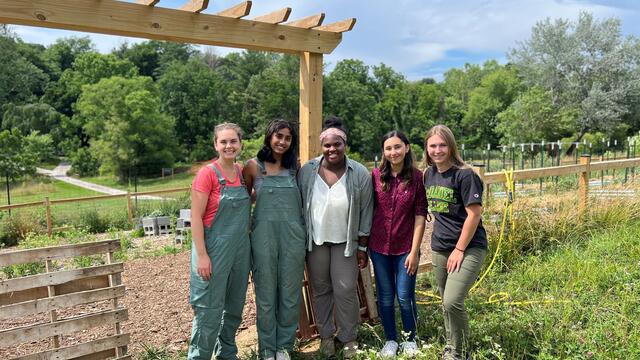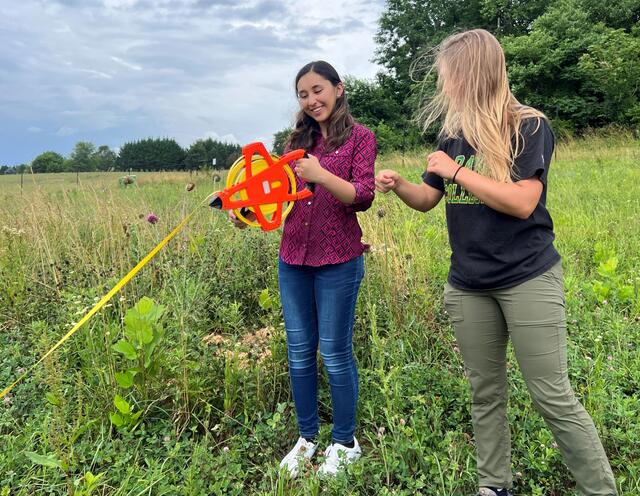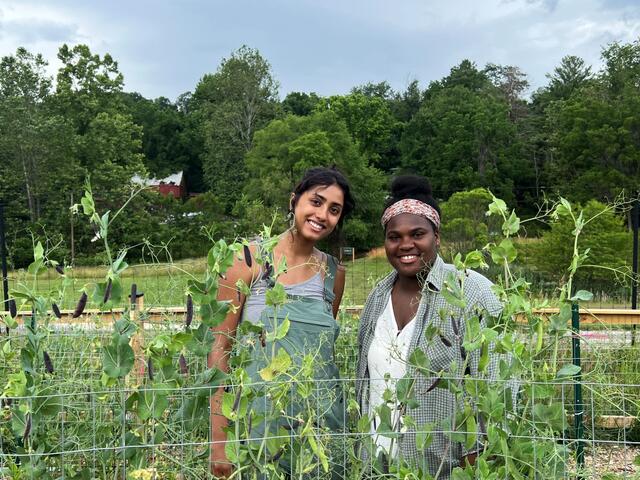Preparations begin for new Jam Garden at McDaniel Environmental Center
Three student researchers are making their mark at McDaniel with the Jam Garden, a new edible plant garden and outdoor learning space proposed by Assistant Professor of Environmental Studies Elly Engle and funded by the 2023 Ira G. Zepp Teaching Enhancement Grant.

As part of the Student-Faculty Collaborative Summer Research Program, three student researchers supported professor Engle in designing the soon-to-be Jam Garden at the McDaniel Environmental Center. As coordinator of the Agrifood Systems Program, Engle also works with two Food Fellows each summer. Pictured above is Engle with students Meghana Manwadkar, Lauren Portis, Hira Khan, and Olivia Sunde (l-r).
Assistant Professor Elly Engle was inspired by two things when she chose the name “Jam Garden” for a new outdoor learning space at the McDaniel Environmental Center (MEC). Jam, a sweet treat made from fresh fruits, and the verb jamming: making something together in harmony.
The upcoming space, which re-envisions an open plot in the Shaffer Forest Garden, will produce both those things, Engle says. “I’m really interested in creating an opportunity for students and community members to be immersed in a space where there are a lot of diversified, sustainable practices going on, and where they can have fun, play music, connect.”
Before the MEC was a center for outdoor learning for McDaniel, it was Singleton-Mathews Farm, so the Shaffer Forest Garden (where the Jam Garden will be integrated) likely had a former life as a conventional cornfield or cattle-grazing land.
By transforming a field into a thoughtfully curated garden, Engle wanted to “bring in the theme of restoration,” both of the land and of people, through the types of plants included.
“The nature of perennial plants is that they store a lot of carbon in the soil, and berries contain a lot of antioxidants,” Engle says. “We’re preserving and restoring the soil while also preserving and restoring our bodies.” The plants in the garden will have edible, therapeutic, and medicinal properties — or all three.
When it was announced in May that Engle’s Jam Garden proposal had earned the Ira G. Zepp Teaching Enhancement Grant, her summer research students pivoted to help lay the groundwork — sometimes literally.

Khan and Sunde (l-r) take measurements of the plot where the Jam Garden will be introduced.
Hira Khan of Littlestown, Pennsylvania, Lauren Portis of Frederick, Maryland, and Olivia Sunde of Reisterstown, Maryland, joined the Student-Faculty Collaborative Summer Research Program to get experience for their future careers, but soon came to realize how meaningful it was to build a brand-new space for future students.
“I’m interested in environmental science and am really passionate about climate change. I’m also studying medicine at the same time, so I wanted to do some hands-on research early on,” says Khan, who is a sophomore Environmental Studies major specializing in Biology.
Through literature reviews and agricultural research, the students selected edible plants that will survive and thrive at the MEC. “We researched how to care for the potential plants, their lifespans and hardiness, sun requirements, and how resistant they are to disease,” Khan says.
“We chose long-lasting plants because we want students to be able to come out here every year, pick berries, take them home, and make something with them. It’s all about community engagement and helping students,” says Portis, who is a senior Environmental Studies major and also a Food Fellow in the Agrifood Program. She took on the responsibility of sourcing the chosen plant varieties at local nurseries.
The researchers have also built an interactive database to serve as a resource for future students. Sunde took point on creating it, bringing to life Engle’s vision for QR code labels on garden signs to share plant information — like nutrition and recipes — with visitors.
They also carefully mapped the garden’s boundaries, to prepare for a fall planting event that will invite community members to pitch in with planting the newest MEC additions.
Community engagement has been a major goal of the MEC, and since its launch, its impact on McDaniel students has been significant. “The MEC is really good for students; it gives a sense of community,” Khan says. And according to Engle, some of the most frequent MEC visitors are students in Greek Life and athletics who complete volunteer service hours in the outdoor spaces.
“The MEC offers a lot of growth for students who don’t even know they’re interested until they come out here,” Sunde says. “They can discover that there is so much more to the environment than just saving the world. You can go in so many different directions.”
One direction available at the MEC beyond volunteerism and research is the Agrifood Systems Program, which uses the Kitchen Garden to grow produce for the campus community every summer and fall, with the gardening completed by Food Fellows.
Sophomore Meghana Manwadkar of Frisco, Texas, is working alongside Portis this summer as a Food Fellow. She is a Biomedical Science major with a minor in Environmental Studies, but it was her parents’ love for gardening that drew her to become a fellow.

2023 Food Fellows Manwadkar and Portis (l-r) harvested snap peas this summer, along with other produce, to share with the campus community as part of the Agrifood Systems Program.
“I’ve learned the reality of farming, that it’s not as simple as just dropping seeds. It’s lots of prep work, starting with seedlings in the greenhouse, bringing them here, watering the plants, and seeing them grow,” Manwadkar says.
For this summer’s researchers, the MEC has been a haven and a site of inspiration. “It’s nice that it’s not fully developed, so we have the chance to add our own touches, our own plants,” Khan says. As a current sophomore, she’ll be able to see the plants through to fruition during her undergraduate career.
But for the two senior researchers, creating the Jam Garden in their last year at McDaniel is bittersweet.
“It’s nice to leave our mark on this place, though I’ll miss seeing it, and the larger MEC upgrades, when it’s completely finished,” Sunde says.
“It’ll be great to be able to come back one day and say, ‘We did that,’” Portis adds.